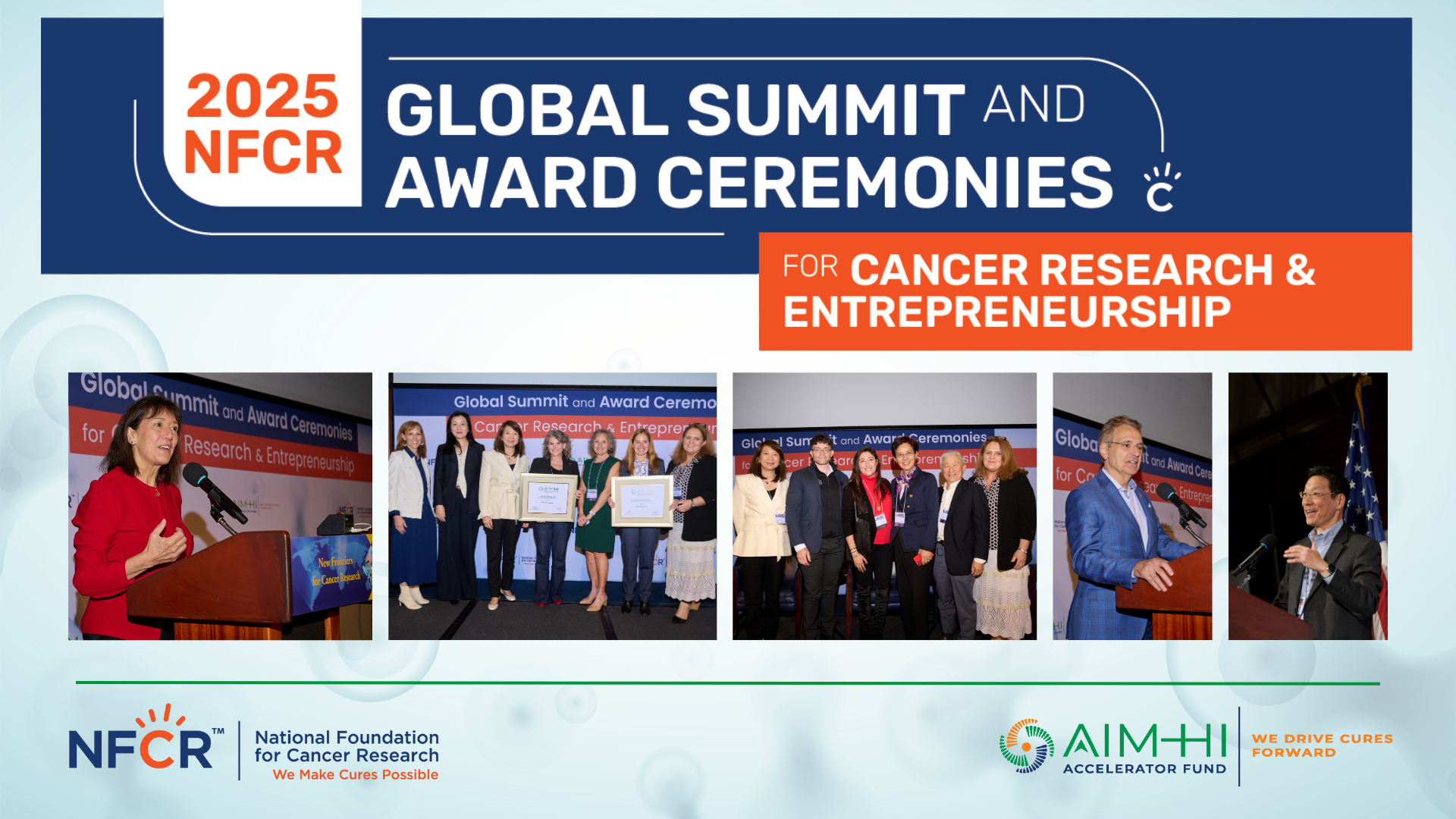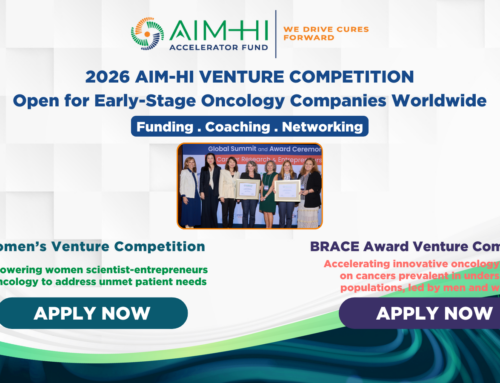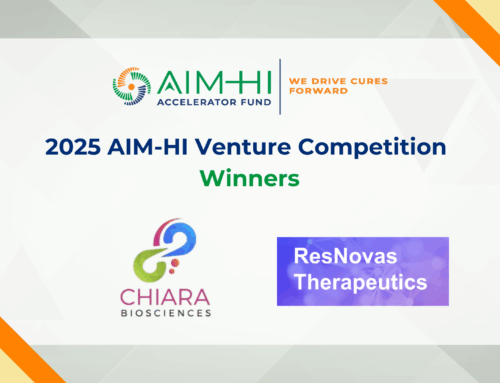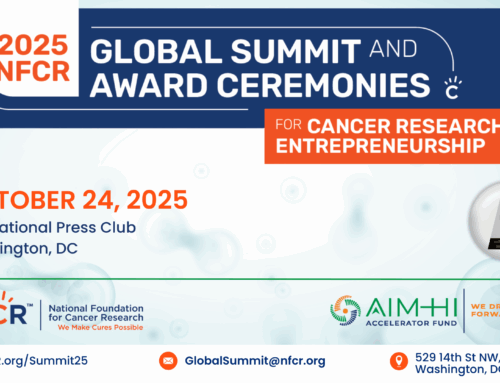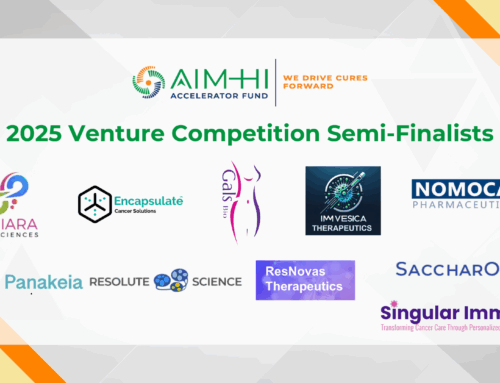The National Foundation for Cancer Research and AIM-HI Accelerator Fund co-hosted the 2025 Global Summit and Award Ceremonies for Cancer Research & Entrepreneurship on October 24 at the National Press Club in Washington, D.C., convening an extraordinary community of leading scientists, clinicians, entrepreneurs, and supporters united by one purpose: to conquer cancer together.
We celebrated innovation and collaboration. We honored one of the true giants in biomedical science whose seminar discoveries led to more than 80 drugs for patients.
From exploring how artificial intelligence is transforming cancer discovery to spotlighting the next generation of oncology startups, and dialogues on the importance of patient-centric cancer research and care. The Summit captured NFCR’s enduring mission: to connect people, science, and innovation in the pursuit of cures.
It is truly a day of forward-looking discussions and groundbreaking ideas.
The AIM-HI Entrepreneurship and Investment Forum
The afternoon program shifted from science to innovation as the AIM-HI Accelerator Fund, NFCR’s partner in oncology entrepreneurship, hosted the Oncology Leadership and Entrepreneurship Forum. The session featured dynamic conversations between investors, innovators, and startup founders working at the intersection of business and science — all focused on accelerating the translation of cancer discoveries into patient impact.
Patty Obermaier, M.B.A., Founder and CEO of Resigility and former Vice President of Microsoft Health, served as Master of Ceremonies for the afternoon program, guiding attendees through a fast-paced series of discussions and presentations that highlighted the power of entrepreneurship to drive meaningful change in cancer treatment.
Catherine Pan-Giordano, Partner and Corporate Group Head at Dorsey & Whitney LLP, opened the forum with a keynote address highlighting the vital importance of strong legal, organizational, and governance foundations for early-stage biotech ventures. She underscored that scientific brilliance alone is not enough — success depends on sound structure, clarity of ownership, and preparedness for regulatory pathways. “Scientific innovation must be matched by structural readiness,” she said. “It’s often the early legal and strategic decisions that determine whether a discovery makes it to patients.”
Following her remarks, the first AIM-HI panel — moderated by Ronald A. DePinho, M.D., former President of The University of Texas MD Anderson Cancer Center — explored the realities of building biotech companies in an industry defined by both promise and pressure. The discussion centered on how founders navigate rapid change, attract investors, and maintain momentum in pursuit of life-saving therapies.
Four pioneering entrepreneurs presented their ventures during the session:
- Michelle Arkin, Ph.D., Co-Founder of ResNovas Therapeutics, showcased progress on next-generation antibody-drug conjugates (ADCs) engineered to deliver targeted therapies with precision and reduced toxicity.
- Kirsten Flowers, M.B.A., CEO and Co-Founder of Chiara Biosciences, discussed her team’s modular drug-design platform, which builds highly specific small molecules to disrupt cancer-driving protein interactions.
- Rick Fultz, CEO and Board Member of Acurion, shared how his company is developing a data-driven precision-oncology pipeline that integrates computational modeling to accelerate drug-development timelines.
- Chih-Kao Hu, Ph.D., Interim CEO and Director of Window Therapeutics, presented novel genomic repair mechanisms designed to restore healthy cell function and stop tumor progression at its source.
The conversation turned to the hard truths of entrepreneurship in oncology. Speakers emphasized the importance of resilience and adaptability, noting that pivots are often unavoidable — and sometimes the very reason companies succeed.
“Many ventures fail not because the science falters,” one participant observed, “but because they give up too soon.” AIM-HI’s unique venture-philanthropy model, which continues investing through critical transitions rather than retreating, was applauded for keeping groundbreaking science alive long enough to reach patients.
From The Investors
A second discussion, “Investor Perspectives for Early-Stage Oncology Companies,” brought together leading voices in venture capital and biotech investment. Matt Tremblay, Ph.D., Chair of the AIM-HI Board of Directors and CEO of Blackbird Laboratories, moderated the panel, which featured:
- Mey Boukenna, M.D., Ph.D., Partner, Life Sciences & Healthcare Investments, Pags Group
- Cynthia Cai, Ph.D., M.B.A., Venture Partner, Viva BioInnovator
- Dimitra Georganopoulou, Ph.D., General Partner, QRAL Ventures
- Jimmy Lu, J.D., M.B.A., Co-Founder & Managing Director, Eos BioInnovation
Together, they discussed how investors evaluate early-stage oncology companies, emphasizing the importance of alignment between scientific vision and funding strategy. The panelists drew distinctions between asset-based and platform-based investors, advising founders to understand their partners’ expectations before seeking capital. “If you do your due diligence on investors the way they do on you,” one panelist said, “you’ll find collaborators who share not just a financial vision, but a mission to help patients.”
The investor group also highlighted the growing demand for cross-sector collaboration, where science, capital, and patient-focused impact converge. “Sustained capital is vital,” Dr. Tremblay noted in closing. “We can’t just fund discoveries — we have to fund their journey to the clinic.”
This Recap is Part Two of a three-part series for the 2025 NFCR Global Summit, focusing on The AIM-HI Entrepreneurship and Investment Forum—don’t miss out on any of the updates. Read Part I, AI in Oncology, and Part III, Honoring Dr. Tony Hunter!

